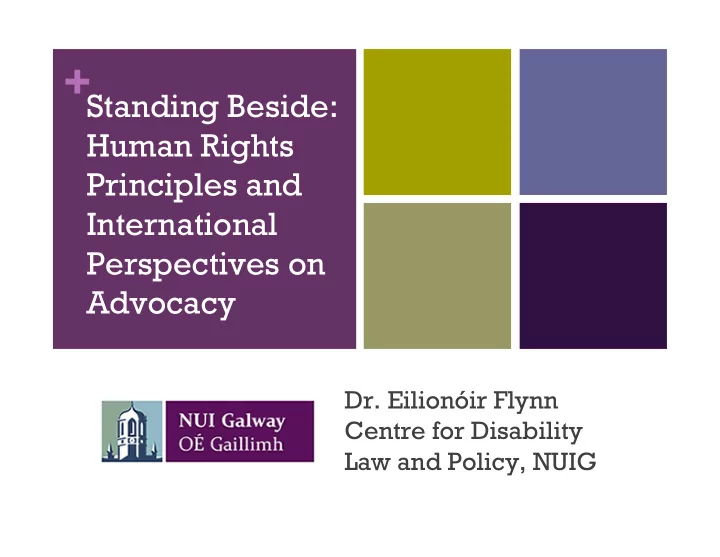

+ Standing Beside: Human Rights Principles and International Perspectives on Advocacy Dr. Eilionóir Flynn Centre for Disability Law and Policy, NUIG
+ Overview � Origins, nature and purpose of advocacy for people with disabilities � Types, models and principles for advocacy � Sources for a right to advocacy in international human rights norms � Future directions – legal frameworks for advocacy based on human rights principles
+ Paradigm Shift in Disability � Move from viewing people with disabilities as passive recipients of welfare to active rights- holders � Acceptance of the social model of disability coincided with greater human rights protection � However, legislative responses are often fragmented and many people with disabilities have ‘fallen through the cracks’ of discrimination protections
+ Nature of Advocacy � Advocacy has become a key element in any move to promote independence and choice in the lives of those who are marginalised � Defined as a process of enabling people to have a voice about matters of concern to them � Not about overcoming inadequacies in the system but rather to empower people by supporting them to assert their views and claim their entitlements and, where necessary, represent and negotiate on their behalf
+ Types of Advocacy Informal ---------------------------------------- Formal Individual ------------------------------------- Systemic Self advocacy ----------------------------- Representative
+ Advocacy Models � Stand before � Stand behind � Stand beside
+ Purpose of Advocacy � Accessing essential social supports, information, making complaints or pursuing rights of appeal � Less restrictive alternative to guardianship/substitute decision-making
+ Principles for Advocacy � Social justice and inclusion for people with disabilities � Rights and entitlements to ensure effective citizenship � Empowerment of people with disabilities and supporting the exercise of autonomy � Systemic advocacy as a tool for reform
Sources for a Right to Advocacy + � Generic human rights � Additional commitments norms in CRPD � Access to Justice � Autonomy rights (equality before the law, � Socio-economic human capacity) rights � Participatory rights � Human dignity principle (public and personal)
+ Access to Justice � Art 13, CRPD, Art 2(3) ICCPR, Art 8, UDHR � Stems from concept of equal citizenship � Construed broadly: “access to the systems, procedures, information, and locations used in the administration of justice” (Lord et al, 2009) � Encompasses the right to an effective remedy for past breach of rights � The ability to access justice is of critical importance in the enjoyment of all other human rights
+ Socio-economic rights � GC 5, CESCR, Vienna Declaration pt 5, Art 12, ICESC � Human rights are indivisible – civil, political, social, economic and cultural � Advocacy as an aspect of progressive realisation – ensuring that these rights can be enforced � “the connection between access to justice, appropriate service delivery and enjoyment of human rights is becoming clearer” (Noone and Curran, 2007)
+ Human dignity � “an expression of the respect and value to be attributed to each human being on account of his or her humanity. It concerns the protection of and respect for the essence or nature of the human being per se - that is to say, the ‘substance’ of mankind” Stix-Hackle, 2004 � Is it a value, principle or legal right? � Certain definitions of dignity and ‘dignified behaviour’ can reinforce paternalism
+ CRPD – Autonomy Rights � Art 12, “access to support in exercising legal capacity” � Need for less restrictive alternatives to substitute decision-making � Advocacy support throughout guardianship process to ensure human rights respected � Involving person in decisions made concerning them
+ CRPD – Participatory rights � Preconditions for participation – rights to education and social services � Enabling participation – rights to involvement in personal and public decision-making � Furthering participation – rights to accessible information and freedom of expression
+ Future directions – a human rights framework for advocacy � State responsibility for advocacy – recognition as a legal right � Involvement of people with disabilities in planning and developing advocacy services � Advocates should support the exercise of legal capacity and promote personal autonomy � Domestic regulation should recognise advocacy’s potential as a tool for systemic reform
Recommend
More recommend